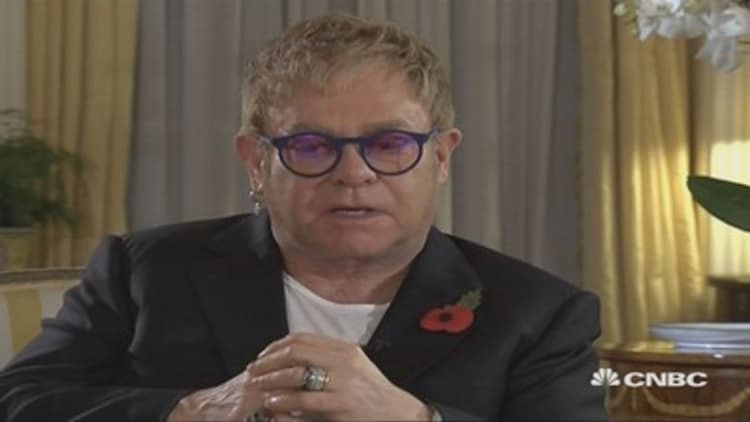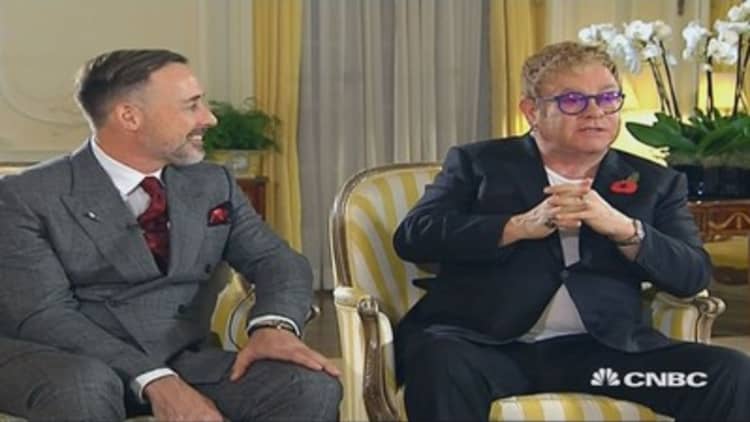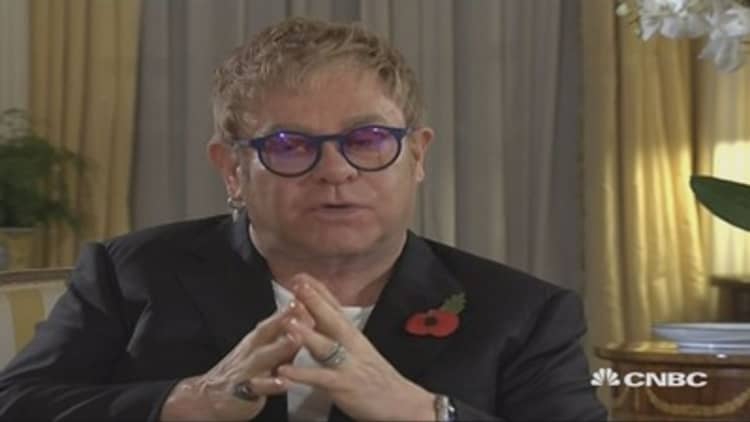


Rock star Elton John is working to use his global fame and charitable foundations to help overturn homophobic laws around the world, telling CNBC that he could petition the queen to force Commonwealth countries to revoke anti-gay legislation and that he was looking forward to meeting President Vladimir Putin after Russian leader extended the "olive branch" to him.
On Thursday John and his husband, David Furnish, will unveil a new partnership with the U.S. President's Emergency Plan for AIDS Relief (PEPFAR), with the Elton John AIDS Foundation and PEPFAR each contributing $5 million to a fund to increase access to medication for people with HIV and AIDS in countries that are prejudiced toward the lesbian, gay, bisexual, and transgender (LGBT) community.
The fund's early focus will be on sub-Saharan Africa. There are 34 countries in Africa where it's illegal to be homosexual, with some threatening the death penalty.
"We're seeing an alarming growth in infections amongst these communities [where] we find that LGBT people are stigmatized where they live," John told CNBC's Tania Bryer.
"It stigmatizes the disease and the conditions where they live and so they don't come out and have HIV tests. They feel nervous about going on the medication, about being labelled or branded as someone with HIV, so we really have to go in and attack the root of the problem and that is the stigmatization and the lack of safe access to treatment and advice and counselling.
"Otherwise, we won't stop the disease in its tracks."
John said the fund would "have to tread very softly" in its initial approach, with talks with local communities, doctors and social services, as well as the authorities.
"You don't go in there and say, 'you've got to do this, you've got to do that,' because that's the wrong way to do it," he told CNBC.
"But I think that the clout that we have as an organization and that PEPFAR do, I think we can change a few minds and that is the whole purpose of this, is to change people's minds and to say listen, this is not just a humanitarian, this is a health issue you're going to have and an economic one at that."
Africa has been the target of international criticism for its treatment of LGBT people.
Nigeria's former president, Goodluck Jonathan, imposed 10-year prison sentences on anyone who demonstrated a "same sex amorous relationship," according to Human Rights Watch. In Uganda, before its AntiHomosexuality Act was struck down last year, a landlord who didn't evict a gay or lesbian tenant could have been convicted for maintaining a "brothel."
In spite of some African governments scaling back their anti-gay laws, violence against gay, lesbian and transgender people in sub-Saharan Africa shows no sign of abating: In February, according to Human Rights Watch, dozens of Kenyan gay men and transgender women were forced to flee their homes as a result of violence following the arrest of two men for "unnatural offences". In 2013 and 2014, at least five South Africans, three of them lesbians, were murdered in what appeared to be targeted violence related to their sexual orientation, according to Amnesty International.
Furnish said that, if necessary, Britain could use its influence in Commonwealth countries to "push a little bit harder" on LGBT rights.
John added: "These laws come from ... the Commonwealth. These laws can be changed very easily by the queen saying, 'change the law.' I haven't approached her about that yet."
When pressed on whether John would approach Queen Elizabeth on the matter, the performer said: "If the worst comes to the worst, one has to, yeah. These are old laws from the British Commonwealth, I mean these can be changed. And so the queen could do that with one wave of her hand."
Uganda, Nigeria, South Africa, and Kenya are members of the Commonwealth group of nations. According to the official website of the British monarchy, although the queen is "not part of the machinery of government in the Commonwealth," she holds private meetings with the countries' leaders during the Commonwealth Heads of Government gathering that is held every two years.
Established in 1992, the Elton John Aids Foundation. which has divisions in London and New York, has raised a combined total of $321 million through special events, art auctions and merchandising to support projects in 55 countries, according to a statement from the charity.
In September, the singer spoke with Russian President Vladimir Putin. The conversation followed a prank call by a pair of Russian comedians who tricked the singer into thinking he was talking with Putin about gay rights. Russia has been the subject of international protest for its treatment of gay people, and John has criticized the country's 2013 law banning "gay propaganda.
John told CNBC's he was making plans to travel to Russia to meet Putin for anti-homophobia talks, after the Russian president extended an "olive branch" to the rock star, offering to meet him if their schedules coincided.
"I feel very honored that he wants to see me and he's put the olive branch out and it's essential that I do go over there and just put my foot in the water and see what we can do (to) change the situation for LGBT people in Russia," John said, adding that the Russian leader was "very genial."
"Even though the Russians say it's great ... it's not great at all. But you know, as I said, I want to try and knock the wall down a little bit, so I will be trying to go and see him."
The musician has also been a vocal force in the campaign for gay rights. In March, John mounted a #boycottDolceGabbana Twitter campaign after the Italian fashion designer Domenico Dolce said that children born through IVF were "synthetic."
In the interview with Italian magazine Panorama, Stefano Gabbana and Domenico Dolce, who are both gay and used to be a couple, talked about their opposition to gay parents. John, who has two children with Furnish, both born using a surrogate mother, responded to designers' comments on Instagram.
"How dare you refer to my beautiful children as 'synthetic'," he wrote. "And shame on you for wagging your judgmental little fingers at IVF - a miracle that has allowed legions of loving people, both straight and gay, to fulfil their dream of having children."
- Phillip Tutt contributed to this report.

